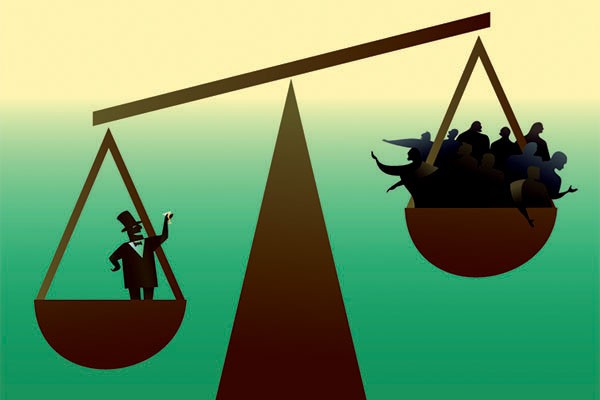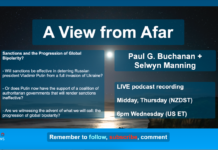Some important work has been done recently in New Zealand that documents the continuing growth in wealth inequality.
Max Rashbrook has followed up his books Inequality: A New Zealand Crisis andd The Inequality Debate: An Introduction with Wealth and New Zealand. They part of a valuable series by Bridget Williams Books dubbed “short books on big subjects”.
Rashbrook acknowledges the huge impact of last year’s international best-selling book by Thomas Picketty called Capital in the 21st Century which similarly focuses on the process of wealth accumulation.
Wealth and New Zealand uses data from a wide range of sources including from Statistics New Zealand which looked at people’s wealth between 2004 and 2010. The Stitics NZ data relies on information provided by respondents voluntarily and is likely to under-estimate the effect of wealth concentration as many of the very rich prefer to conceal their accumulated wealth. The National Business Review’s annual Rich List is also an important souce.
The book explains its purpose: “We can only really understand poverty by understanding affluence.”
The basic facts are clear: “In New Zealand, as elsewhere, the wealthiest tenth typically has about 50 per cent of all assets, while the poorest half of the country has almost nothing.”
The wealthiest one percent, about 34,000 adults, possess 18.1 percent,
Like Piketty he says that this wealth is increasingly being concentrated in fewer and fewer hands. Between 2004 and 2010 the wealth of the one percent increased from $94 billion to $147 billion. The wealthiest 10% increased their wealth from $259 billion to $473 billion. The poorest 10 percent saw their debt increase from $5.7 billion to $7.4 billion.
The Wealth Gap Tower is a fantastic graphic that has been produced to demonstrate this inequality that is based on earlier data so the numbers differ a little.
Rashbrooke is very clear that the wealth inequality he examines is the product of social, political and economic policies of successive governments. “The share of national income going to people who rely on salaries and wages,” he explains, “has fallen sharply since the 1980s, and is much lower in New Zealand than is normal for developed countries. Salaried workers have lost around $19 billion a year, or $10,000 per wage earner per year, to the owners of capital.”
Similarly, the real value of benefits in relation to the average wage are much lower in New Zealand than many other countries.
Inequality remains a hot political issue in this country. Just prior to the last election the NZ Herald reported: “Almost a fifth of New Zealanders (18 per cent) now say poverty, the gap between rich and poor or the imbalance of wealth is now “the most important issue facing New Zealand”, up from just 4 per cent in the equivalent poll just before the 2011 election.”
Max Rashbrooke’s books are performing an important service in keeping the issue to the forefront and deserve to be read and shared.







‘Mind the Gap’ by documentary maker Bryan Bruce covers the failure of Neo-liberal economics in New Zealand. It needs to be shown again over the holiday period by Maori TV perhaps but is also on Youtube.
https://www.youtube.com/watch?v=__2EdGFdgTA
Neo-liberal economics = State Asset Stripping
@ JACK RAMAKA . Exactly.
Let the rich be rich. If that makes them happy, then so be it. Let them stand up on their hills of money and fondle their baubles if they must.
But as I always say to them. Give us our money, assets, infrastructure, mental and physical health, our time on this earth and our lost children and our suicide victim’s lives back? Then you can be as rich as you like. In the mean time and while I wait for that to happen? I’m their enemy. I’m their sworn enemy and I’ll never give them peace. And if my plans go to plan. I’ll be giving those deviant scum restless nights for generations to come and long after I’m dust in a bucket.
Our old people crossed dangerous oceans then worked hard to give us more security, more advantages, a more peaceful life of better health, better mental stability and happier, less worrisome times than they ever had and their very writhing, foetal bastards we know today were born to them to steal the product of all their hard work away and now we’re back to where we started.
This quote should be tattooed on the back of every citizens left hand.
” The price of freedom is eternal vigilance. ”
Or, if one has hands the size of a Welsh coal miner’s pony’s arse.
“Eternal vigilance is the price of liberty;
power is ever stealing from the many to the few.
The manna of popular liberty must be gathered each day or it is rotten.
The living sap of today outgrows the dead rind of yesterday.
The hand entrusted with power becomes, either form human depravity or esprit de corps, the necessary enemy of the people.
Only by continued oversight can the democrat in office be prevented from hardening into a despot;
only by unintermitted agitation can a people be sufficiently awake to principle not to let liberty be smothered in material prosperity.”
When you look at the Rich Listers in NZ many have had close associations with the Government of the day and have curried favours with the Government, NZ was built on hard work by the Maori People and the Early Settlors, who made NZ one of the most prosperous countries in the world until the 1970’s when we were rated No 1 in the OECD Statistics, since Muldoon and his hair brained schemes and Rogernomics in the 1980’s the country has been gutted by the merchant bankers.
We have lost control of our banks, insurance companies, forestry, and now we are selling off our farmland and housing stocks.
Thank you Mike I will read those books. It is totally obscene and sad really.
I was invited to Queenstown to paint live art. I was spoilt and put up at a stupendously rich person’s holiday house, I didn’t meet the person. But it made me think having the chance to see life from that angle. It made me really sad actually, not envious just looking at the huge amounts of money this person could spend on a whim, stuff just waiting for his return, it was eye popping and mouth gaping! It was obscenely gross wealth and revolted me after a few days.
I was happy to come home to my collection of tamed wild cats and fat fed wild flock of sparrows, and the bumble bee nest under the window sill in the bedroom wall humming away at night, yes they hum at night they are so cute.
I suspect no more invites for you!
Queenstown is such a circus I actually find it disturbing, it has turned into a total mess. And watching tourists with their backs to the view gawking at a cell phone on a stick was the last straw. What a total joke! I lived there for years working as a tour guide and ski field worker and hadn’t been back for a while. All I can say is what a shame. I don’t really see anything there than a human circus of rich people troughing and imbibing day and night and doing donuts on the lake in stupid boats. Then all the cars driving around and around in circles. They have ruined it!
Don’t worry , mate… we’ve got a bicycle track as a work in progress employing 200 people…its not finished yet after 8 years of Keys govt but he did promise the creation of 300,000 jobs before he got elected…
And just like the Mainland cheese ad said….’ good things take time’ ,…cept..we’re all gettin kinda hungry out here in real life and somehow those politicians wage rises don’t seem all that fair what with unemployment reaching towards 7 % and all these days…
Maybe the bloody cheese will have to wait cos us farmers have decided to march on parliament…
Yeah…fuck the bloody cheese…
Rashbrooke is very clear that the wealth inequality he examines is the product of social, political and economic policies of successive governments. “The share of national income going to people who rely on salaries and wages,” he explains, “has fallen sharply since the 1980s, and is much lower in New Zealand than is normal for developed countries. Salaried workers have lost around $19 billion a year, or $10,000 per wage earner per year, to the owners of capital.”
Having access to capital is the key to maximising wealth, hence merchant banking and stripping State Assets is where the easy money is to be made.
It is not rocket science.
Poverty and Progress in New Zealnd – a reassessment by WB Sutch
Bill Sutch lays out the history of what made NZ. Poverty is an outcome of “progress” as the wealthy would call it
Progress and Poverty – Henry George.
A much older treatise on basic myths and economic of our modern culture and the ills of land ownership from which massive inequities arise.
Norman Kirk reawakened the discussion on land reform as well as setting up a contributory superannuations scheme that invested in the State of NZ unlike the Cullen / Clark Kiwisaver which adds fuel to the private investor state which is notorious for gobbling up funds and assets..
Check out these fuckers . And here we are ? Obsessing about patched gangsters .
The New Zealand Initiative .
http://nzinitiative.org.nz/About+Us/Board.html
You want to know where our money went and how we ended up being laughing stocks of the First World for our beastly incarseration rates and poverty? Start here .
Sir Ron Trotter . Lincoln University educated farmer type’s Alma Mater. Their motto could have been “Know your enemy, then fuck them on the deal. ”
http://nzinitiative.org.nz/shop/Library+by+type/Reflections+on+a+Life+Well+Lived%3A+A+Tribute+to+Sir+Ron+Trotter.html
There are those of you who will be trying to make sense of what’s happened to NZ / Aotearoa , perhaps simply because you’re too young to have experienced the treachery that’s occurred . Let me introduce you to the great NZ institutionalised lie.
Honesty ? You think it started with jonky ! ? One day, you people will wake up. And I don’t mean that in a flippant way. You will literally wake up. To an awareness of what’s happened to our wealth and our society . Mark my words .
There’s also not a bad summary of how and why …… by Jacques Peretti in a BBC doc called “The Super Rich and US”.
It’s on Youtube I think, and just popped up of all place on the Living Channel for those of us who are wasting money on pay TV.
Comments are closed.